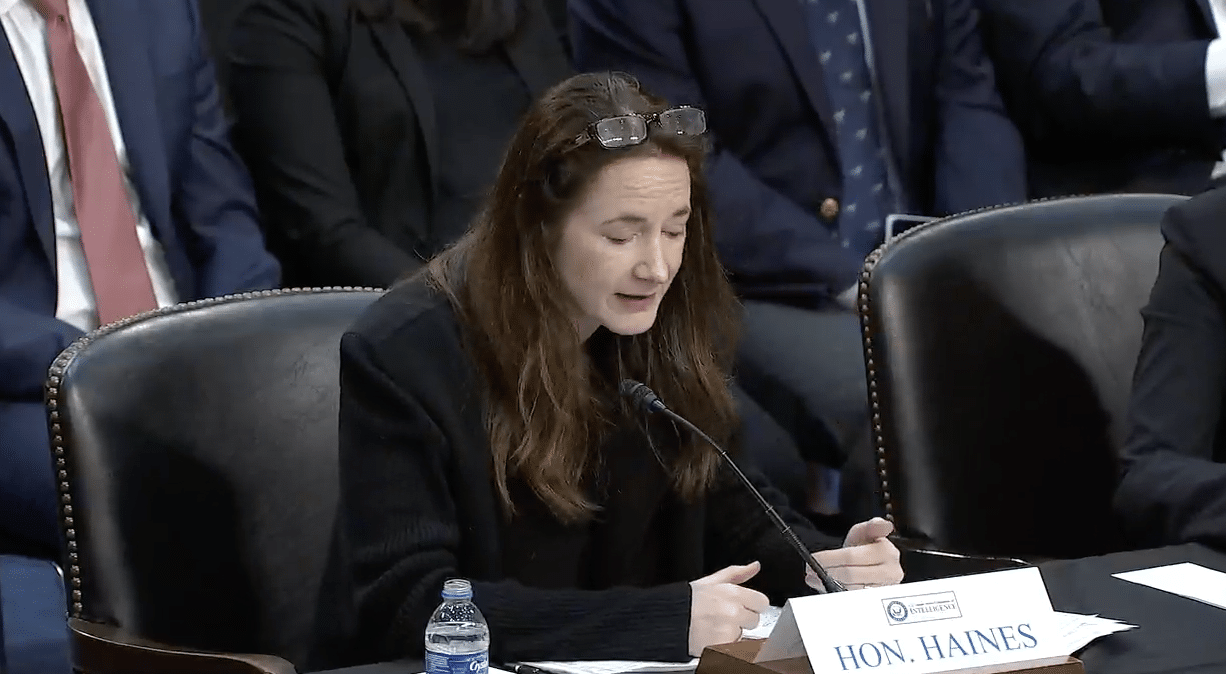Jim Risch Demands that Avril Haines Formally Tell Us He Is Lying
The Senate Intelligence Committee had a hearing on election interference yesterday. Among the pieces of news is that the US intelligence community is sharing intelligence with European partners in advance of the EU Parliamentary vote next month to alert them to foreign interference efforts, something that was pretty clear to me but which journalists and European-based privacy activists had denied.
The entire hearing was undergirded, however, by a truth and a lie aspiring Donald Trump running mate and Vice Chair of the committee, Marco Rubio, offered up.
The truth is that if the IC says foreign spooks are trying to hurt one candidate, supporters of the opposing candidate will refuse to believe that claim.
For eight years, of course, Republicans have institutionally refused to believe that Russia tried to hurt Hillary and tried to help Trump. That made supporters of both parties trust their party more than the spooks. And in the aftermath, Trump has carried out a sustained campaign to get his followers to distrust The Deep State.
So the problem, at least for the MAGAts that Rubio wants to make him Vice President, is worse than Rubio said.
Rubio made several false claims in his comment, however.
Rubio: No matter who puts it out there, the candidate on the other side of it, their followers are going to question whether it’s the government interfering in the election themselves. And it’s not helpful, and I use this example because it’s a very recent one, when the whole laptop situation happened, the Hunter Biden laptop, a number of former intelligence officials, I get it they’re formers, no longer in the employ of any of these agencies, but that title carries weight, all signed a letter saying, “this has all the hallmarks of a Russian disinformation campaign.” We know now that it was not a disinformation campaign. I don’t want to get into the particulars of what was on it, I’m just saying it was not a Russian disinformation campaign.
But the result of it was that social media companies would not allow anyone to post the articles — and there was a media blackout; it could not be reported in any other except for one place, and so what happens as a result of that, whether it had an influence on the election or not, the result of it now is that we have some section of the country who repeatedly says things like the intelligence community interfered. [my emphasis]
Most obviously, Rubio claimed that “the result of [the letter 51 former spooks sent out] was that social media companies would not allow anyone to post the articles.” The letter from the spooks was dated October 19. The social media companies started throttling links to the NYPost on October 14. Days before the spooks’ letter, the social media platforms had already begun reversing their decision.
Rubio’s claim of causation defies physics.
That’s not his only false claim. Rubio certainly believes that the release of the hard drive was not a Russian disinformation campaign. Which is not what the former spooks said anyway — they said it might be a Russian information operation. But even four years on, it’s not certain what happened to Hunter Biden’s laptop before it was turned over to the FBI, and Hunter claims with some evidence that it was altered by Rudy before it was released to the NYPost.
I laid out some reasons we couldn’t be sure back in October, when Bret Baier made this false claim in a gotcha with Leon Panetta.
There are still more. For example, the FBI’s apparent uncertainties about even the date of a payment made from Hunter’s Venmo to someone the government claims is a stripper suggest they have not reviewed what happened to Hunter’s digital life after one of his devices was stolen in August 2018. Hunter said in January 2019 — before the laptop ultimately shared with John Paul Mac Isaac was packaged up — that he believed that theft happened when he was with a Russian sex worker. More recent filings have made clear that — contrary to a whole lot of credulous reporting — the laptop shared with the FBI is not an exact match with his iCloud account, which means device content made while in treatment from Keith Ablow does not have the same kind of validation that other data does. And given there are signs of compromise to Hunter’s accounts going back years, it’s not clear anyone has ruled out earlier compromise.
The FBI has never even done an index of everything on the laptop.
Unless someone else in government did such analysis — unless David Weiss’ prosecutors are sitting on more thorough analysis than they have shared with Hunter Biden — the FBI simply never did the work they would have needed to do to find out if the President’s son was compromised by Russians, whether spies or criminals, or some other foreign actor.
I don’t doubt that Rubio believes that the IC is more certain though.
Things disintegrated from what I think was a good faith concern (albeit one without any kind of accountability) on Rubio’s part to a rant by Jim Risch.
He thinks it is Avril Haines’ job to call out people who have access to intelligence who make false claims. He says he’s as concerned that 51 private citizens made a claim that remains true — that, in their opinion, the laptop, “has all the classic earmarks of a Russian information operation” — as he is that Russia will attack US democracy again,
Risch: I’m as concerned with this sort of thing as I am with foreign interference on the election process. This was deplorable, these 51 people saying this was Russian activity when we all know now that it wasn’t. I mean, these were 51 people that had very significant influence in American society and they sent this letter saying this was Russian influence.
Again, Jim Risch says it is as bad that experts express their well-substantiated opinion as it is that hostile nations target our democracy.
He demanded that Haines promise to go out and tell the American people if private individuals say something false this year.
What about this sort of thing, where it’s domestic interference, that’s obviously false. Who’s got the responsibility for standing up and looking in the camera and saying, folks, don’t count on this it’s not true. Is that going to be your responsibility?
Haines: Sir, I think … look … my responsibility with respect to formers that speak out and provide the wealth of their experience and knowledge in such circumstances is not to determine what they should or shouldn’t say, but rather to ensure that they’re not disclosing classified information, that we’re protecting that, and dealing with that, it’s not —
Risch: What if it’s false? using their robes of, … having knowledge of security matters and intelligence matters and you know it’s false. Is that your response, or you just say, nah I’m not gonna get involved in that.
Haines tried to correct Risch’s false representation of what the spooks actually said, noting that their experience made them suspicious (but stopping short of stating as fact that it was an information operation).
Haines: I don’t understand, because I think — first of all, I think they said that their experience makes them deeply suspicious of that activity.
Risch lied and said they had said something more.
Risch: They went a little further than that, I think, but I’ll take your characterization of that. And if you know that that’s false? Then you come into the information that it’s false, is it your obligation or not your obligation to stand up, look in the camera and say, folks, when you’re voting don’t take this into account.
Haines: Sir I don’t think I could make sure that I’ve even read everything that a former might have said or that anybody else is on these issues, so no, I don’t think that it’s appropriate for me to be determining what is truth and what is false in such circumstances.
It went on and on, with Jim Risch wailing about people with privileged access to intelligence — people like him — who make false claims. Sadly, no one ever strongly laid out Risch’s false claims, and Mark Warner even professed to be sympathetic to Risch’s view.
Risch: But what if you know. You’re sitting here, you’re the center of intelligence in America, right there, and this has come out and you know it’s false. What’s your obligation? Or do you have any?
Haines: I think my obligation is to ensure that the best intelligence is being provided to the President, to the Federal government, to the Congress, and where possible, to the American people, through declassification, which we would do.
Risch: That’s not calling out someone who stands up and purports to have intelligence information that you know is false?
Haines: Sir, if I were to — first of all, I’m not sure I’m the best arbiter of what is true and false, and secondly–
Risch: Let’s say, in a particular instance, you’ve seen the paper. You know it’s false. Let’s take that instance. What do you do?
Haines: I mean, it depends on the situation. If we’re talking about a fake video that was
Risch: It’s just what I said: someone with intelligence credentials stands up and says I know this from an intelligence standpoint and you know, as the Director of National Intelligence, that it’s false.
Haines: No, I do not consider that to be part of my responsibility. If there is disinformation that is put forward — false information — then we have the capacity to authenticate it as false, we will do so, basically to our customers, and there will be a process [inaudible and crosstalk] it may be to the public, it might be classified information, it might be anything else, I don’t what the circumstances are. It’s too much of a hypothetical.
Risch: I’m not making progress so I’m going to give it back to you.
Warner: My sense is it would be the responsibility of the FBI if it were proven. I’m not sure if we want the Director of National Intelligence commenting about a domestic statement made by an American, but I understand your point.
Risch: Well, that’s the purpose of this hearing, is to find out how American voters are going to be, uh, kept informed if it is true or false.
Warner: It is, our purview, at least, is focused on that foreign influence. But I understand your point.
Of course, the logical end point of Risch’s complaint is quite clear: He has demanded that Avril Haines go make a public statement that, in spite of Risch’s privileged access to intelligence, he is lying. And Marco Rubio is too!
It doesn’t stop there.
If Haines is supposed to police truth claims by private citizens, she would be obliged to come out publicly and say that Rudy’s public claims about Joe Biden were not just false, but fabrications of the Russian spies he was soliciting.
According to Jim Risch, not only should John Ratcliffe have publicly debunked Donald Trump’s false claims about Italy hacking voting machines via the thermostat (or whatever version of that nutjob story he was telling), but Haines today should formally debunk false claims that Trump is making about Solar Winds as part of his criminal defense.
Jim Risch is demanding that Avril Haines intervene and call him — and call Donald Trump — liars.


